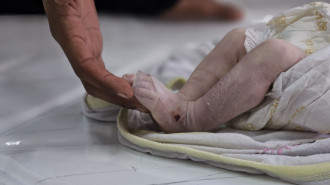Breadcrumb
Refugees in Libya held in 'concentration camp-like' conditions
Refugees in Libya are being subjected to torture, rape and even execution by human traffickers who are holding them, a German newspaper report claimed on Sunday, citing German diplomats posted in Africa.
The comments come as the EU mulls a migration deal with the North African country.
"Executions of countless migrants, torture, rapes, bribery and banishment to the desert are daily events," the Welt am Sonntag quoted an internal report from the German embassy in Niger as saying.
The diplomats' report, intended for the office of German Chancellor Angela Merkel and various ministries, spoke of "the most serious, systematic human rights violations," the paper said.
The report said that the "concentration camp-like" conditions in the "private prisons" were documented by credible photos and videos shot with mobile phones.
"Eyewitnesses spoke of exactly five executions by shooting every week in one prison - announced in advance and [carried out] on Fridays to make room for new arrivals: in other words, to increase the human 'throughput' and thus the profit of the operators," Welt am Sonntag said.
The head of the parliamentary party of the Greens in the European Parliament, Ska Keller, told the paper that the European Union should not strike any deal with the Libyan government amid reports of human rights abuses.
She said that people would be "sent back to a catastrophic and inhumane situation," and that the German government should oppose any new deal with Libya "with all its might."
On Friday, EU heads of state and government plan to meet in Malta to discuss how to reduce the flow of refugees to Europe from Libya and other North African states.
Chancellor Merkel said in her regular podcast on Saturday, however, that a deal with Libya could only be considered "when the political situation in Libya has improved."
More than 180,000 people came over the Mediterranean from north Africa to Italy last year, with almost 90 percent setting out from Libya. Many are fleeing conflict or poverty in their native countries.
Thousands have died attempting the perilous Libya to Italy crossing, operated by people-smugglers.
![Libya refugees [Getty] Libya refugees [Getty]](/sites/default/files/styles/image_345x195/public/media/images/7AAF4513-6A23-4082-8093-68867444A5CB.jpg?h=d1cb525d&itok=FPw-4tVw)





![Anthony Blinken speech [Getty] Anthony Blinken speech [Getty]](/sites/default/files/styles/image_684x385/public/media/images/6263436E-8ACD-4D3C-9055-25A7BE79DD5A.jpg?h=d1cb525d&itok=fLHmHCRG)
 Follow the Middle East's top stories in English at The New Arab on Google News
Follow the Middle East's top stories in English at The New Arab on Google News


